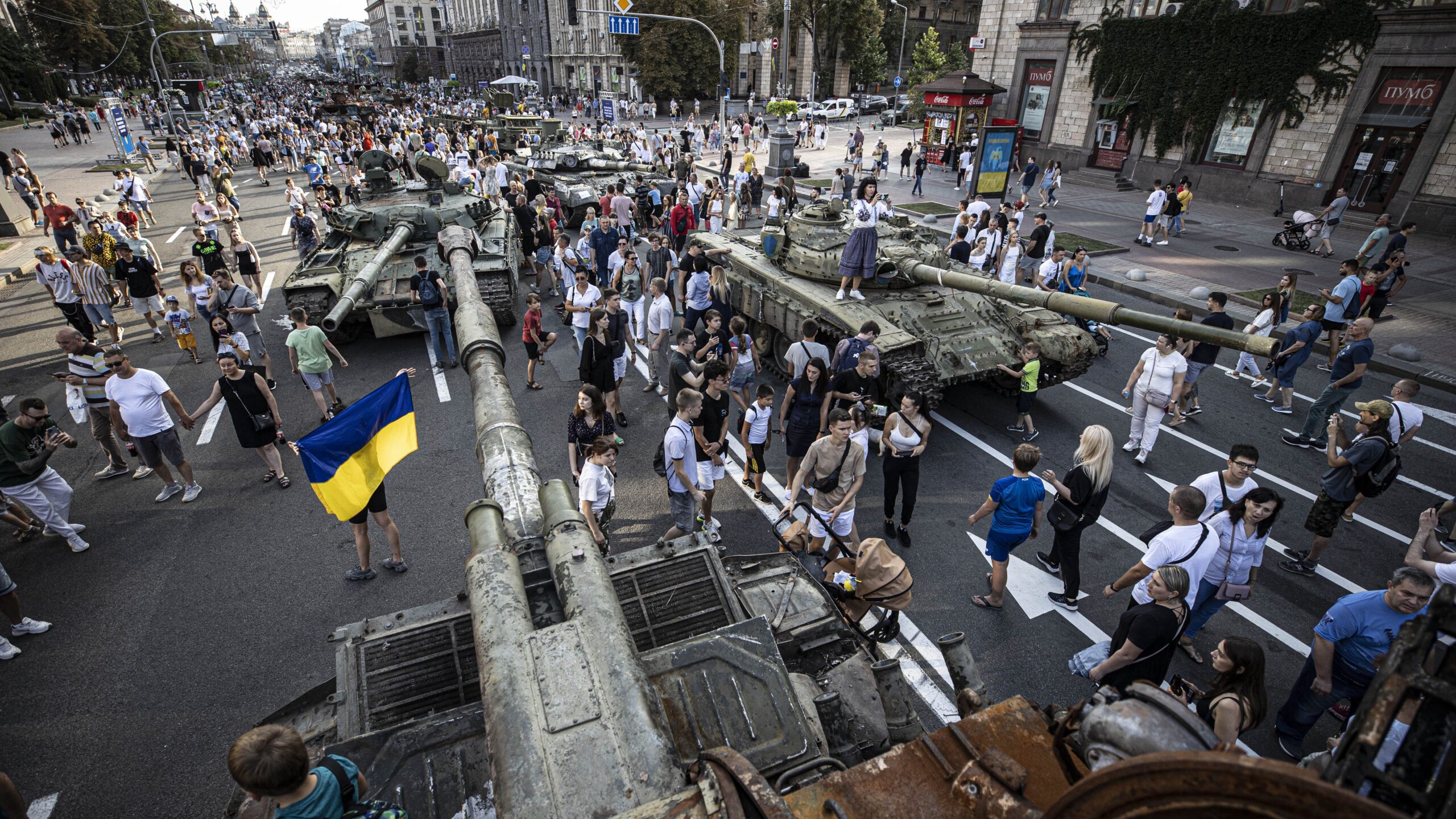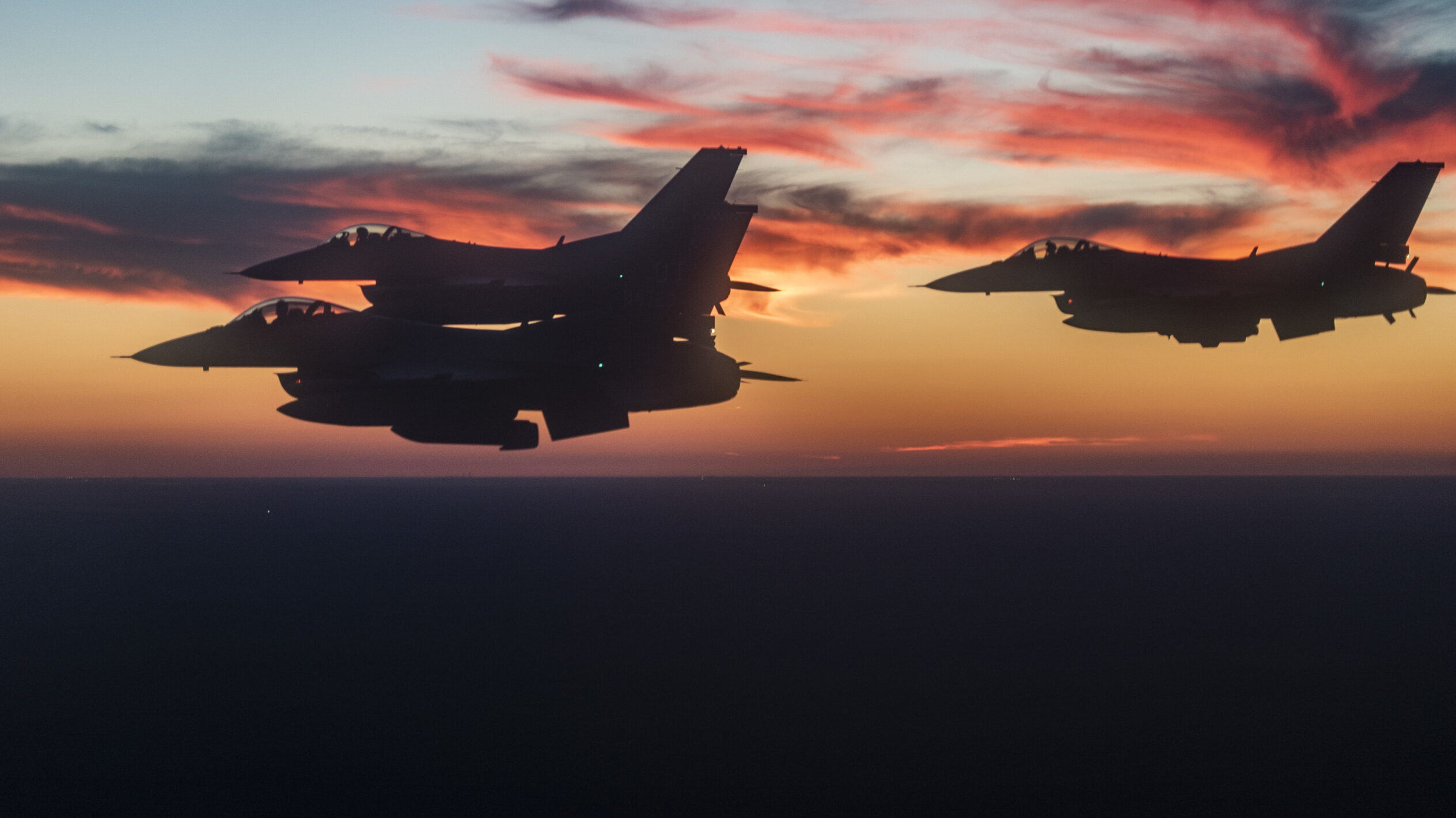
KYIV, UKRAINE – AUGUST 21: Ukrainians arrive at Khreschatyk Street to see the seized military equipment and weapons including tank and motorized artillery systems belonging to the Russian army displayed by Ukraine ahead of the country’s 31st anniversary of Independence Day in Kyiv, Ukraine on August 21, 2022. (Photo by Metin Aktas/Anadolu Agency via Getty Images)
MUNICH — The annual Munich Security Conference (MSC) has always been a forum for discussions about challenges in the military and diplomatic spheres. But an actual, live war in the center of Europe made this year’s outing decidedly different than any of those of the past three decades.
Talking about weapon systems and procurement at the nuts-and-bolts level is a departure from the traditional focus of presentations at the MSC. In a forum known more for abstract policy issues, themes related to “Increasing levels of dialogue” or “building new structures within the international community” are more typical. But last week, politicians and policy makers instead made a rare venture into the unfamiliar territory of discussing concrete realities of weapon systems and defense production.
Perhaps it’s no surprise, a year into Russia’s invasion of Ukraine, that a running theme of the conference was the anaemic spending levels that is the norm for the post-Cold War era European nations’ defense budgets. The discussions in Munich brought to mind the words of the late Andrew Marshall, who headed the Pentagon’s Office of Net Assessment from 1973-2015, “the Europeans have spent a decade or more going out of the business of defending themselves.”
Russia’s invasion is driving an increasing realization that defense industry matters to a degree not previously appreciated by many. In the short term, there is an escalating sense of urgency over how the off-the-charts rate of ammunition consumption continues to exceed current production tempo. In the longer term there is the stark acknowledgement that almost a year into the conflict there are no off-ramps in sight and no prospect of that demand slowing down.
“We have never had a conference like under these circumstances,” said the MSC’s long-time chairman, former Ambassador Wolfgang Ischinger, who spoke to Breaking Defense on the sidelines before the first day’s official sessions. “Those circumstances are a regional war that is here in Europe – and where one of the protagonists is a nuclear power.”
“One also has to ask if there is a way to ever establish a ceasefire that is sustainable under these conditions of such hatred,” he continued. “Certainly, the level of hostile diatribe broadcast by Russian state media is not helpful.”
The lack of any potential cease-fire scenario was echoed in the opening session of the official conference agenda, which was an unannounced video link address by Ukrainian President Volodymyr Zelenskiy.
Delivering his prepared remarks in English and responses during Q&A in Ukrainian, he reiterated a long-standing position: Despite many voices calling for an immediate end to the conflict there will be no negotiations concerning Ukrainian territorial concessions, including the land in Crimea and the Donbas claimed by Russia in 2014.
Invoking a Biblical analogy to characterize Ukraine’s fight against Russian President Vladimir Putin’s military he said “there is no alternative but to defeat the Goliath that came to destroy our life. The David is here and is fighting, but we do not yet have the David’s Sling from Israel.”
The reference to the David’s Sling air and missile defense complex was another attempt by Zelenskiy to convince PM Benjamin Netanyahu’s government to supply this system to Kyiv, and a sign of the kind of focus on specific weapon systems that would permeate the conference.
Built by Israel missile maker Rafael, it is a medium-range air and missile defense system capable of intercepting either missiles or aircraft at ranges between 25 and 180 miles. For months Kyiv has been lobbying Israel to join the list of nations providing Ukraine’s military with sophisticated weaponry. But Jerusalem has, to date, provided largely non-lethal aid so as to avoid antagonising the Russians — a precarious balancing act necessitated by Moscow’s military presence in Syria.
Zelenskiy publicly repeating his request for David’s Sling was partially prompted by the growing alliance between the Kremlin and the radically anti-Israeli regime in Iran. Ukrainian defense officials, and their supporters, are hoping this development may prompt a change in Israeli policy.
“Since so much of Israel weaponry contains considerable US content — if the system is not a complete off-the-shelf US system to begin with — Russia’s actions in this instance are significantly aiding the Jewish state’s most implacable enemy,” said a NATO member state military official here in Munich. “Iran having full access to these systems will over time degrade the qualitative edge Israel enjoys over Iran’s largely outmoded, previous-generation inventory of weaponry.”
Zelenskiy also iterated the other imperatives that he sees as the only possible outcomes of the war with Russia.
“There is no alternative to victory,” he said, a common them echoed by other speakers over the next two days. “There is no alternative to Ukraine joining the EU and there is no alternative to Ukraine joining NATO.”
Turning to the story of the ancient duel once again toward the end of his speech, the Ukrainian president told the assembled delegates “David did not defeat Goliath by the power of conversations but by the strength of actions. We need to make the sling stronger. To all of our partners here in Munich — I am grateful for you that you are giving David the sling that we need to keep fighting.”
Germany’s Honest Assessment
The next speaker, German Chancellor Olaf Scholz, had some unusual revelations about the less-than-perfect situation with his nation’s military.
Germany’s lack of defense readiness has been a sore point for years, with a parliamentary report in 2018 describing the situation in the armed forces as dramatic. Scholz stated Germany is now “putting an end to the neglect of the Bundeswehr. This will result in an increase in military expenditures, and as I said two days after the war, we will increase the German defense spending up to 2 per cent of GDP.”
But beyond just a pledge to increase budget outlays to provide necessary funding for the armed forces, the German chancellor detailed projects for the defense industrial base itself:
- Germany does not have the time to develop an analogue to the US High Mobility Artillery Rocket System (HIMARS), so it is proposed that the system will be license-manufactured by Rheinmetall. The armaments conglomerate will make the warheads and the rocket motors for the system and will then mount the launchers on German-made vehicles.
- “The European SkyShield air defense system is a step towards the creation of a European capacity to resolve conflicts in our neighborhood,” he stated. The program currently has 17 nations participating and it is designed to create an integrated air defense network across Europe.
- Germany will resume production of 35mm ammunition for the Gepard self-propelled anti-aircraft batteries that it has previously supplied to Ukraine.
- Scholz also called for “the creation of a competitive arms industry in Europe and that we must all work together in the joint development of European capabilities. We are also building up the capacity for semiconductor production and strengthening our supply chains.”
The SDP leader then proposed a “permanent production of defense capabilities” — production lines that do not shut down or “gap” for extended periods of time. The process of spooling up production after too many years has created very real dilemmas for German efforts to supply hardware to Ukraine.
RELATED: First German Leopard 2 tank deploying to Ukraine ‘very soon,’ but who will be next?
A number of the Leopard 2 tanks proposed for Ukraine are in storage in Germany and would require considerable refurbishment before being shipped to the front. While Scholz at the conference announced 14 tanks would be headed to Ukraine “very soon,” it’s unclear how quickly other tanks may find their way there.
Lastly he suggested that defense production in Germany could be brought to a level where it met not only Germany’s requirements, “but also for [long term] support in Ukraine. We could also have Eastern European partners in the supply of munitions having them engage in license production” of German weapon systems.
While this is all a tall order for the German defense sector, there are also very real bottlenecks even for the US. Aside from the unending demand for munitions supplies (i.e. more Javelins, more Stingers), Washington has still not come to a solution for Ukraine’s air power needs.
The Airpower Question
There have been numerous proposals to provide Ukraine with the US-made F-16 — either from active inventory assigned to USAF units or from third-party export customer nations. This, however, has proven to be more complicated that it sounds.
One of the foreign military officials who spoke to Breaking Defense explained that the most practical solution regarding an F-16 would be for the aircraft provided to Ukraine to be serviced and supported by personnel in Poland, which is an operator of the F-16C/D Block 52+.
However, he explained, “it would really need to be the same configuration of Block 52 that the Poles are operating. The Polish squadrons are all powered by Pratt & Whitney F100-229 engine. If the Ukrainians were to be delivered F-16 variants fitted with some version of the GE F110 this would create logistical problems. Likewise with the radars. The Polish aircraft have the APG-68(V)9, which again is not the identical radar that is in every F-16C/D aircraft.”

F-16 Fighting Falcons from Eglin Air Force Base fly over a high school football game in Niceville, Fla., Sept. 24, 2021. The Okaloosa County Schools held a Prisoner of War/Missing In Action remembrance ceremony prior to kick-off. (U.S. Air Force photo by Master Sgt. Tristan McIntire)
Other proposed options have been for the Ukrainians to receive some older Mirage 2000 models from France, some of which are being retired as the newer Rafale models come into inventory.
What the different European nations all seem to agree on is that none of the NATO alliance nations were prepared for a conflict of this duration and intensity, nor had they ever considered the idea that an enemy such as Russia would be prepared to prosecute such a war in the face of increasingly steep losses in both personnel and equipment.
Speaking on a later panel, the UK Defense Secretary Ben Wallace declared that in the face of these unforeseen developments, the result of “Russia’s brutal invasion of Ukraine, and the global response to it, go to show the importance of our international alliances and partnerships.”
But he added that there were lessons to be learned from the 12 months of war since Russia’s invasion.
“The Ukraine war has exposed the West’s lack of readiness. Our willingness to provide assistance, our willingness to deploy – all has been tested and has been found wanting,” Wallace said. This is a situation not to be repeated because in a conflict one “always needs to be keeping our adversary guessing.”
Wallace’s boss, UK Prime Minster Rishi Sunak later told the MSC that “When Putin started this war, he gambled that our resolve would falter. Even now he is betting we will lose our nerve. But we proved him wrong then, and we will prove him wrong now.”








